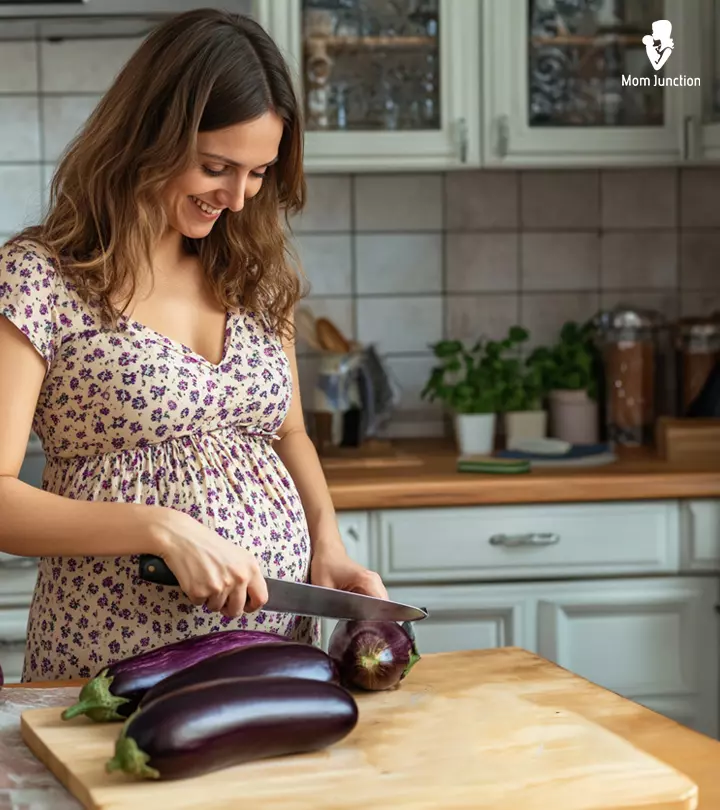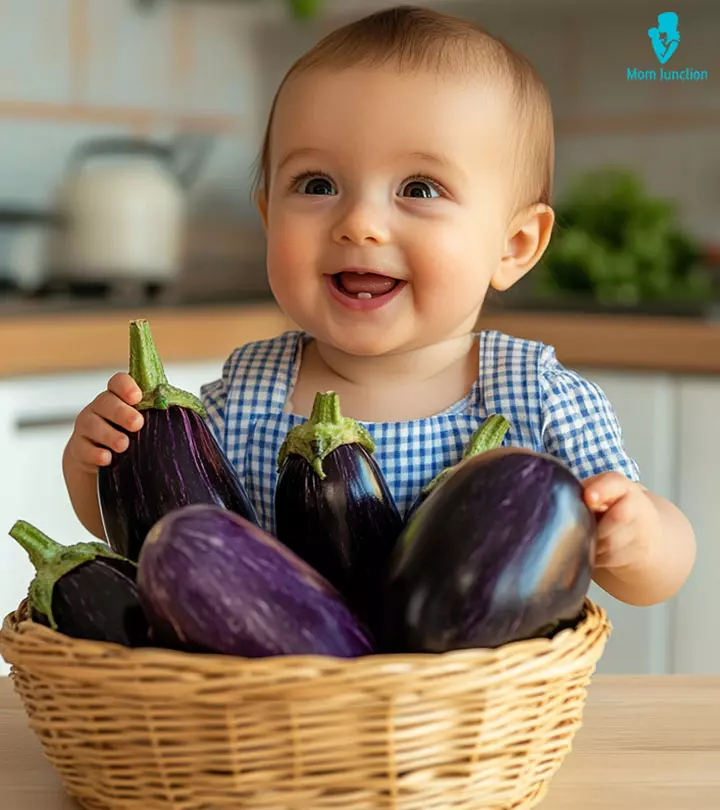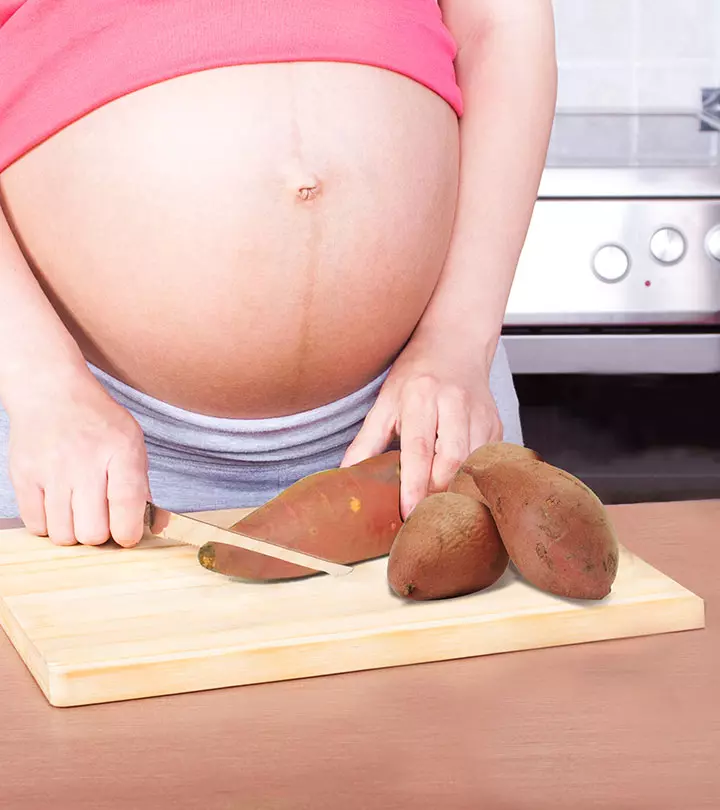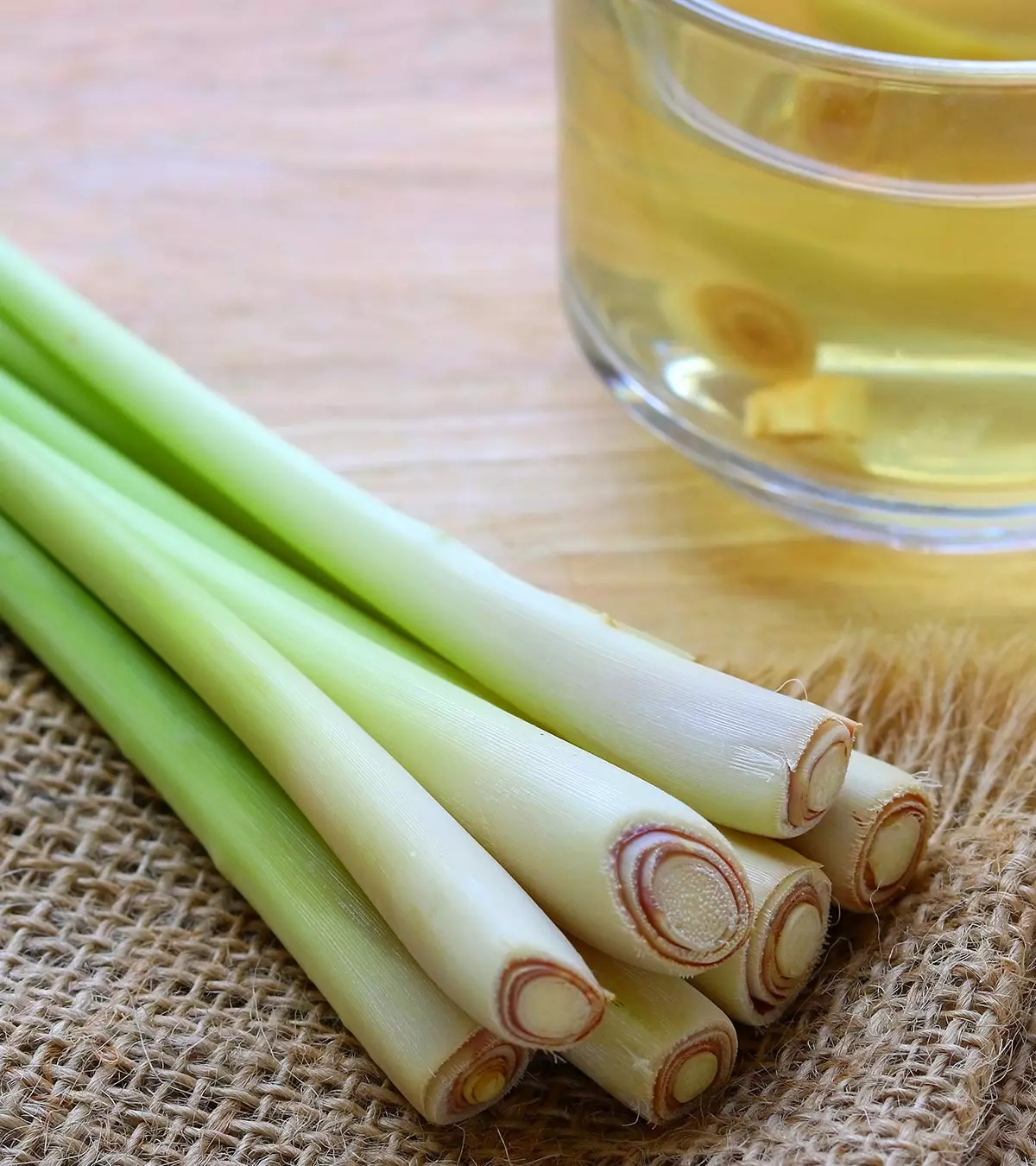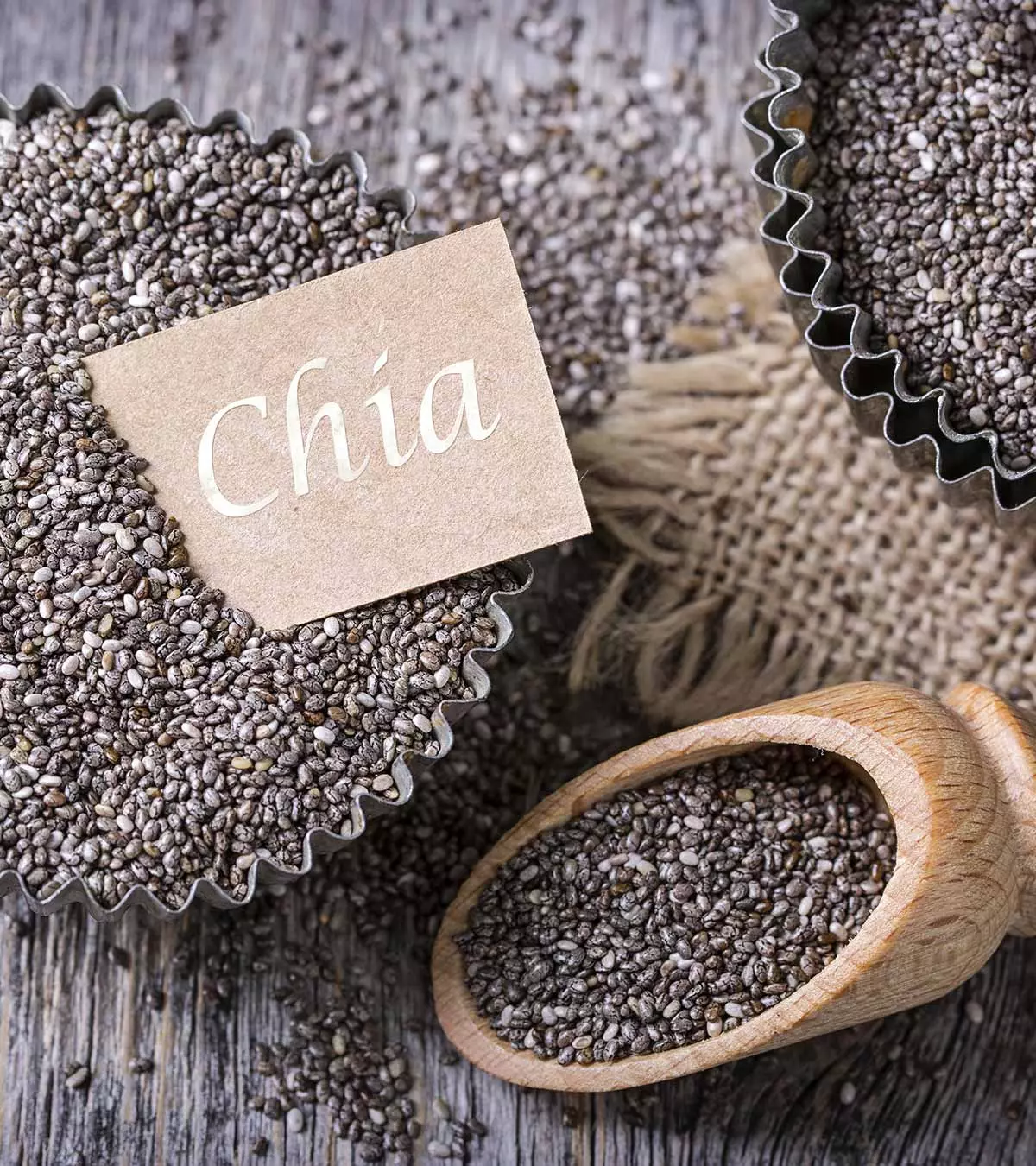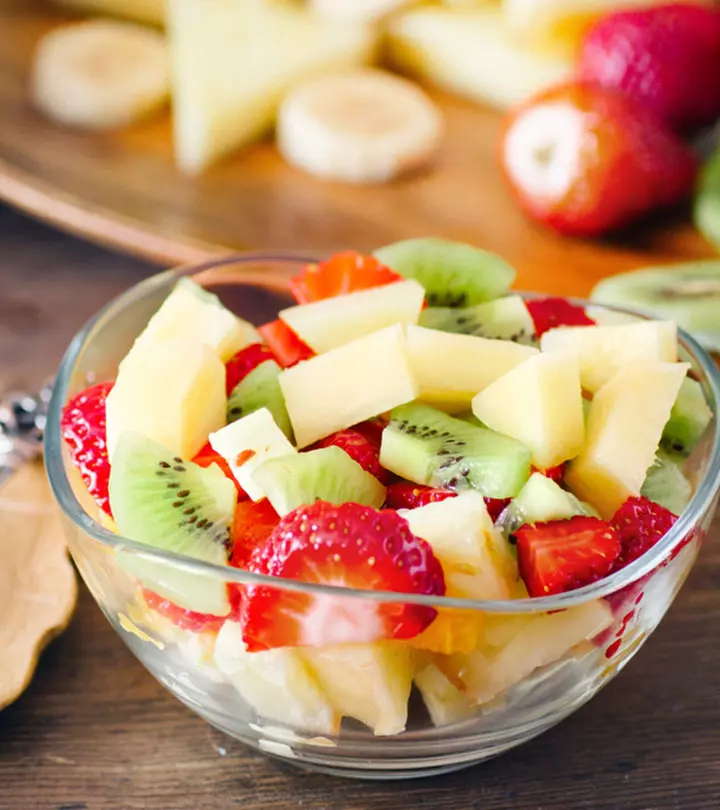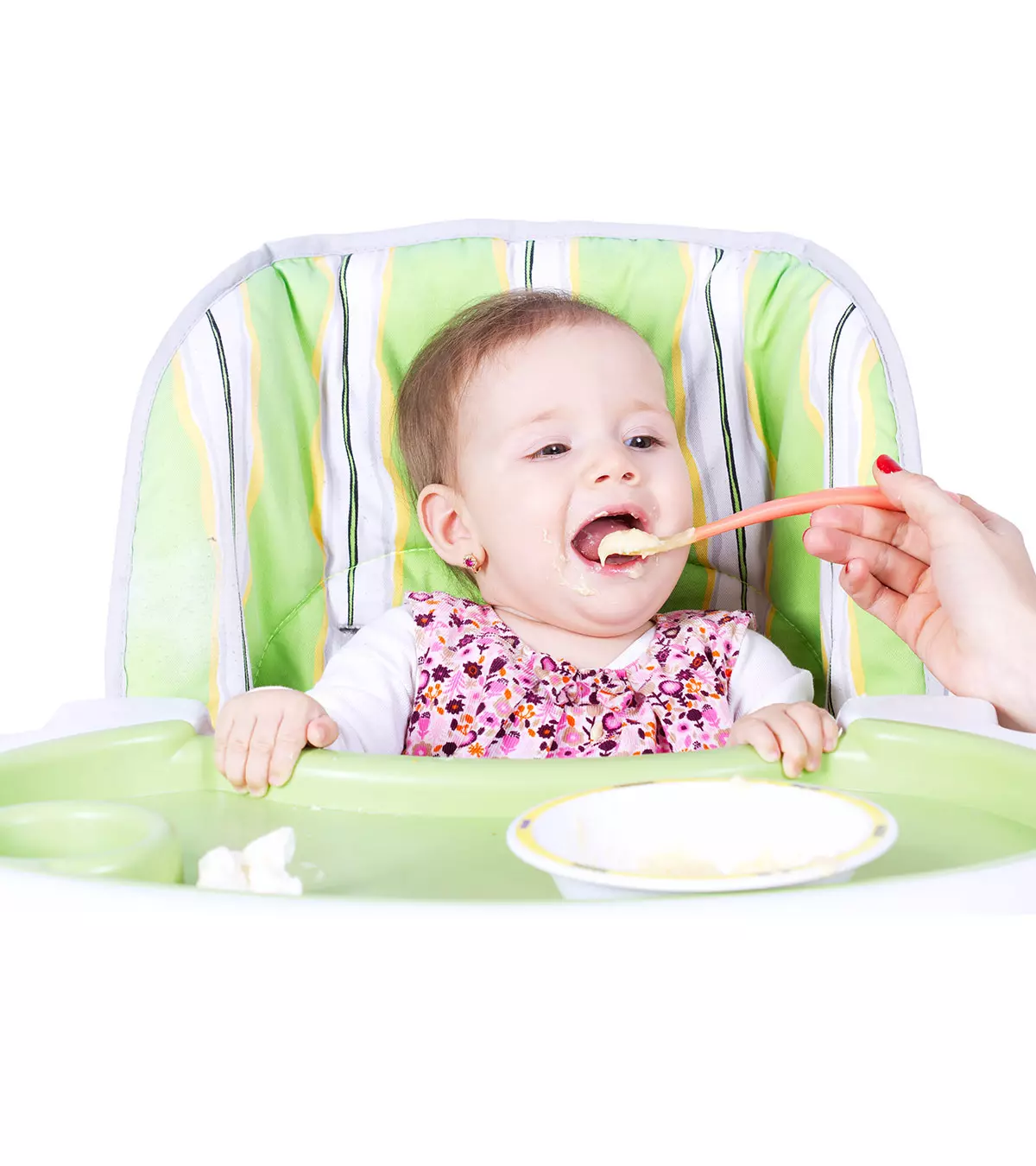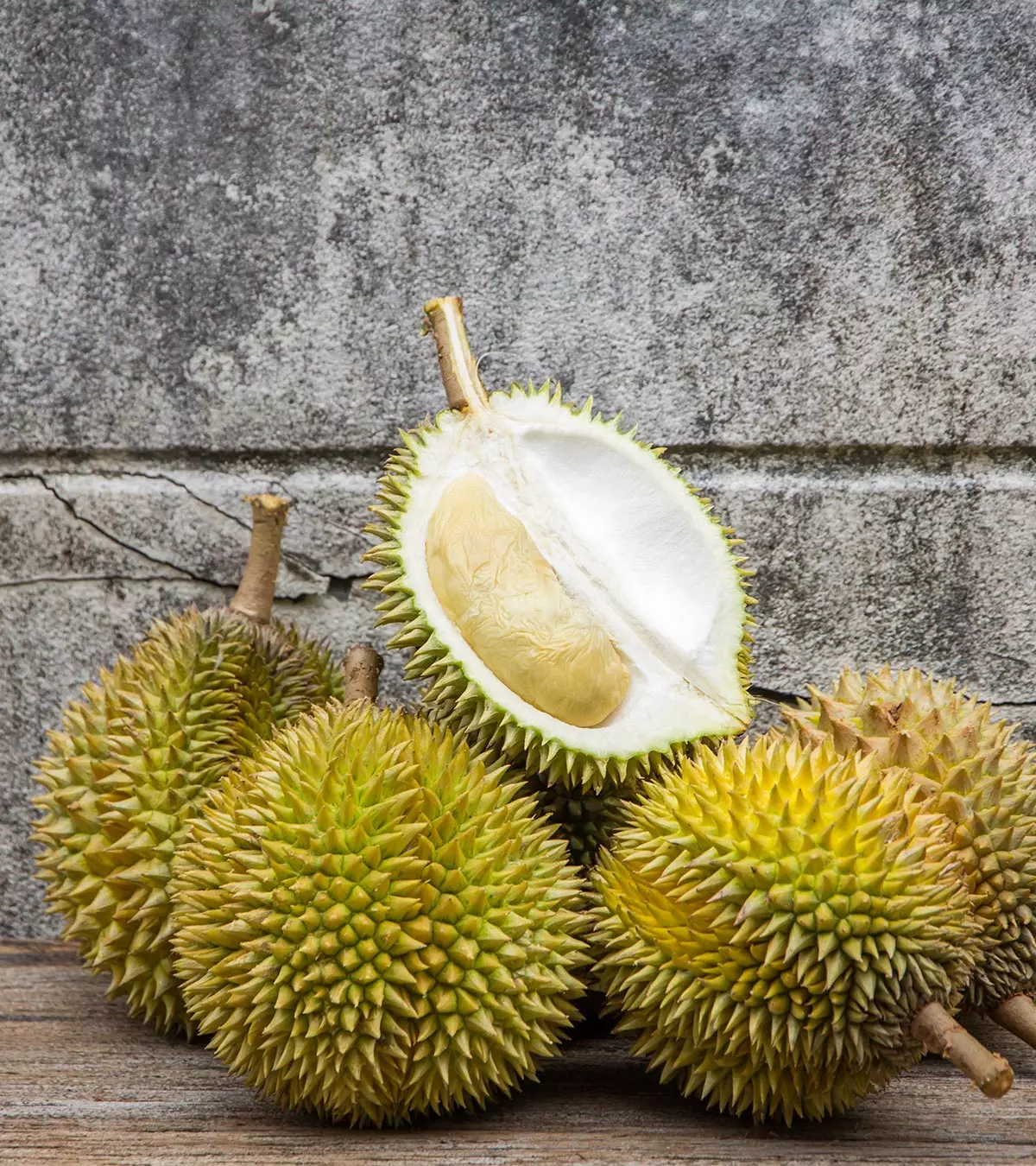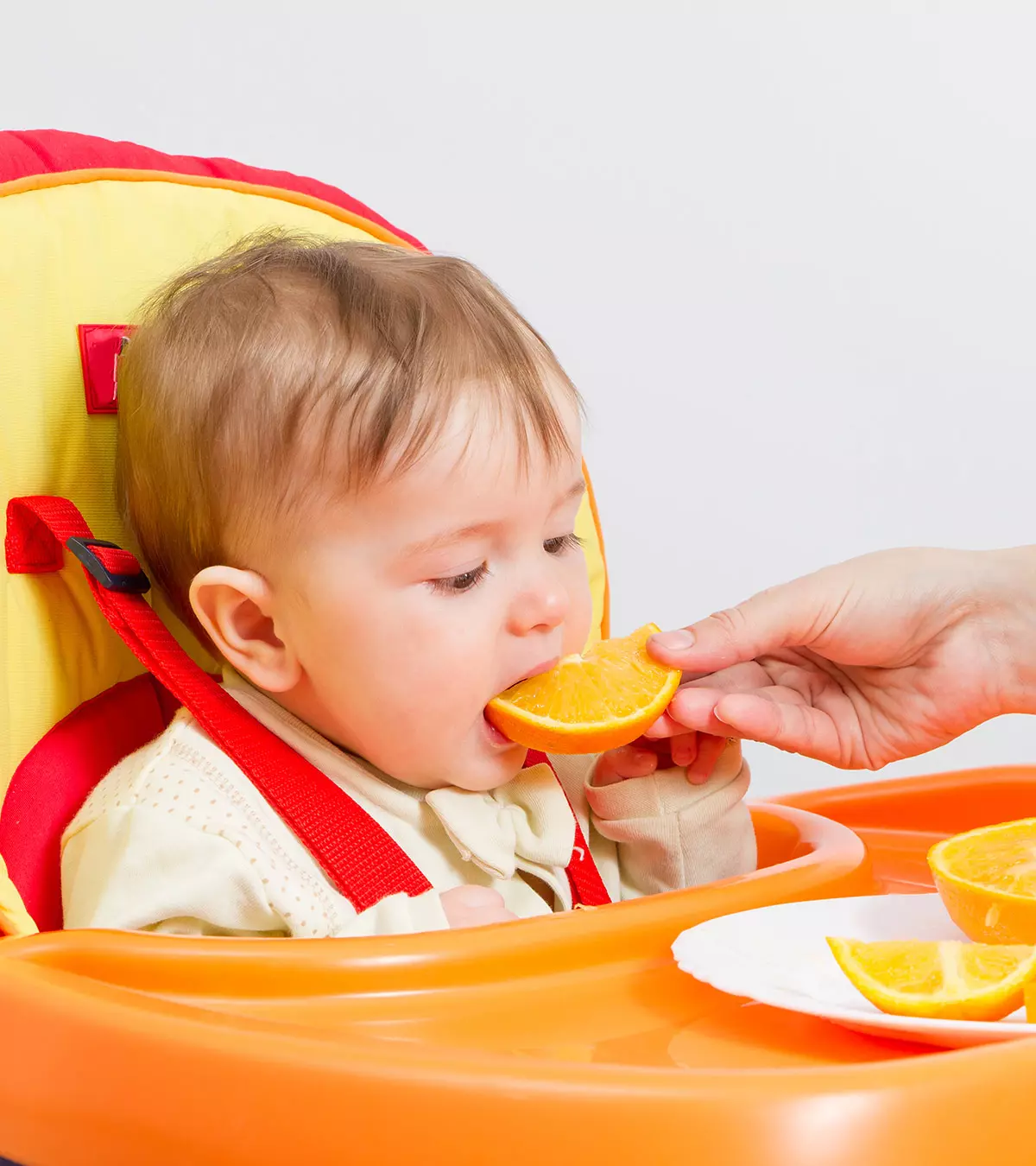
Image: ShutterStock
Mother’s milk is the prime source of nutrition for an infant in the initial six months. If you are planning for your baby’s weaning diet, you may be keen on including vitamin-rich fruits like oranges for babies. However, as you continue to breastfeed, you may have to begin solid diets for your baby at this time. This way, you can have your baby explore new tastes and various food textures. However, before adding fruits like oranges to infant nutrition, you might want to understand the safety aspects of it. Read on as we discuss the possible reactions, health benefits, age-appropriate ways to include oranges in your baby’s diet, and some interesting yet easy-to-digest recipes with oranges.

Key Pointers
- Oranges can be introduced to the baby’s diet safely after six months, but it is ideal to wait for a year if there are known allergy risks.
- Hives, rashes, vomiting, wheezing, diarrhea, and nausea may be some allergic reactions to oranges in babies.
- Oranges are rich in vitamin C and fiber content and can help strengthen the digestive system and build immunity.
- Serving fresh and sweet oranges in small deseeded slices, peeled, and cut into bite-size pieces will help prevent choking in babies.
When Can Babies Eat Oranges?
The American Academy of Pediatrics (AAP) observes that foods need not be delayed because they are typically allergenic, especially to babies who have no known risks of allergy or sensitivity (1).
Lisa Richards, a nutritionist from the Greater Edmonton Metropolitan Area, suggests, “Oranges can potentially cause gas in babies due to their high acidity and the presence of certain sugars such as fructose. While oranges are a nutritious fruit rich in vitamin C, introducing them to a baby’s diet should be done cautiously. The acidity of oranges can sometimes upset a baby’s sensitive stomach, leading to discomfort and gas.”
So, if you want to introduce citrus foods earlier than 12 months, you may do so but do watch for any reactions. Start with moderate amounts and wait for three to five days between introducing any two new foods. This will help in identifying the cause of allergies if any.
However, if your baby has previously shown sensitivity to other acidic foods, wait for them to complete one year before you give oranges.
Reaction To Acidic Foods
If your baby is sensitive to acidic foods, orange might provoke rashes in babies younger than 12 months of age. The high acidic levels could result in diaper rashes and rashes around the mouth and lips.
Other possible outcomes of an allergic reaction could be hives, vomiting, wheezing, swelling, breathing troubles, watery eyes, diarrhea, or nausea. These symptoms may show up within two hours after eating the fruit. If you see any, seek medical attention. It is advisable to consult a pediatrician before offering any new food to the baby.
Sensitivity to citric acid: Babies are usually not sensitive to citric acid after they cross 12 months. Ascorbic acid is vitamin C, and you will seldom find anyone with an allergy or severe sensitivity to vitamin C.
Health Benefits Of Oranges For Babies
Oranges are not just rich in vitamin C but also contain other vitamins and minerals. One orange contains approximately 12% of the RDA for fiber.
Value Per 100 Grams
| Water | 86.7 g |
| Energy | 52 kcal |
| Protein | 0.91 g |
| Total lipid (fat) | 0.15g |
| Carbohydrate, by difference | 11.8g |
| Fiber, total dietary | 2g |
| Sugars, total | 8.50g |
| Minerals | |
|---|---|
| Calcium | 43mg |
| Iron | 0.33mg |
| Magnesium | 11mg |
| Phosphorus | 23mg |
| Potassium | 166mg |
| Sodium | 9mg |
| Zinc | 0.11mg |
| Vitamins | |
| Vitamin C, total ascorbic acid | 59.1mg |
| Thiamin | 0.068mg |
| Riboflavin | 0.051mg |
| Niacin | 0.425mg |
| Vitamin B-6 | 0.079mg |
| Folate, DFE | 25µg |
Source: USDA (2)
By evaluating the nutritive composition of orange, we can deduce the following:
- Indigestion or dyspepsia is common among babies. Oranges can help in strengthening the digestive system of your baby.
- Feeding pulpy fruits such as oranges can help reduce the chances of constipation as it is high in digestion aiding fiber. Fresh orange juice, diluted with water, is believed to help in dealing with diarrhea.
- The vitamin C in oranges could help provide relief from cold and cough. The fruit could also protect your baby against secondary infections as it helps in building immunity.
 Health fact
Health factHow To Serve Oranges To Babies?
You may serve the fruit in small slices instead of making a puree. Peel, section the orange, cut into pieces and de-seed. Peel off the membranes that cover the pulp bulbs and serve the bulbs to the baby. Cut them into bite-size pieces so that they don’t slip into the little one’s throat and choke them.
Feed fresh and sweet oranges as a healthy snack. Check the condition of the fruit and avoid it if you find some soft spots.
Packaged orange juice or pulp might contain preservatives and added sugar. Also, the process of packaging reduces the nutrition in the juice. Therefore, make fruit and vegetable juices for babies at home and offer them fresh to your little one. Try to feed the orange juice as soon as it is prepared to avoid its oxidation. Give it in the baby’s favorite sipper to make it more interesting.
You may also mix the orange pulp with other fruits and vegetables such as blueberries, avocado, cranberries, peaches, sweet potato, yogurt, and chicken. We’ll tell you how, in the next section.
Simple Orange Recipes For Babies
1. Orange Yogurt Pops

Preparation time: 10 minutes
You will need:
- 1 orange (peeled, de-seeded)
- 1 cup yogurt
How to:
- Puree the orange, add the yogurt and mix well.
- Transfer to ice cube trays and freeze until solid.
Note: The popsicles are for toddlers and may not be suitable for babies.
2. Orange Juicy Carrots
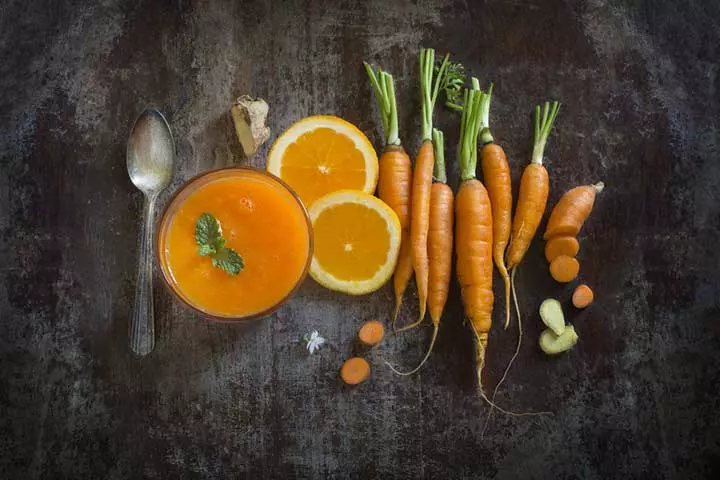
Preparation time: 15 minutes
You will need:
- 1/2 pound carrots (peeled and diced)
- 1/4 cup orange juice
- 1 cup water
How to:
- Add water and orange juice to carrots in a saucepan.
- Steam carrots until tender.
- Mash if needed.
3. Orange Baby Sherbet

Preparation time: 90 minutes
You will need:
- 1 orange (peeled, de-seeded, cut)
- 1 cup apple juice
How to:
- Blend orange, add apple juice, and blend further.
- Pour into a freezer-proof container and freeze for an hour.
- Blend once again. Transfer back to a container. Freeze until firm.
4. Orange Banana Mash

Preparation time: 20 minutes
You will need:
- 1 banana (sliced)
- 4tbsp orange juice
- 2tsp apple juice (unsweetened)
- 1tbsp olive oil
How to:
- Add olive oil to a pan and keep it on medium heat.
- Add banana slices and sauté. Add orange juice and apple juice, and sauté for some more time.
5. Baby Orange Julius

Preparation time: 5 minutes
You will need:
- 1/4 cup orange juice
- 1/4 cup apple juice (unsweetened)
- 1/2 cup breast milk or baby formula
- 1tsp vanilla
- A pinch of cinnamon
How to:
- Mix all the ingredients. Blend to get a runny consistency.
6. Orange Dahl
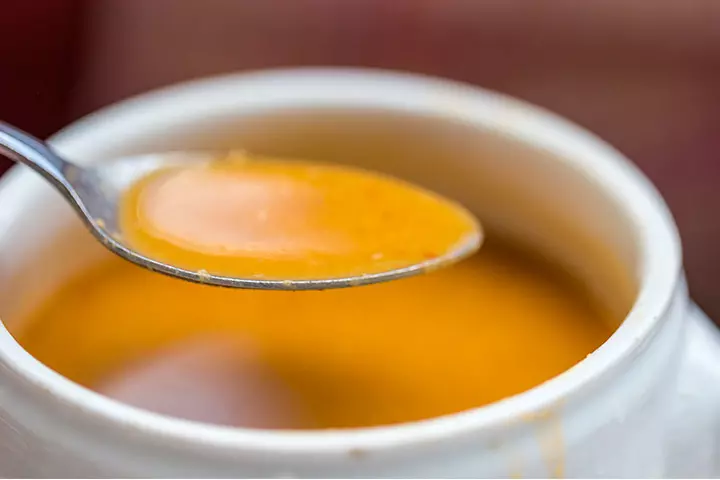
Preparation time: 30 minutes
You will need:
- 1/2 cup lentils
- 1/4 cup orange juice
- 1 1/4 cup water
- cinnamon
How to:
- Pour water in a pan and add lentils to it. Cover it with a lid and cook for 20 minutes.
- Stir in orange juice and cinnamon. Turn off the heat.
- Pour the contents into a blender and blend well.
7. Yogurt With Mandarin Oranges For Babies

Preparation time: 5 minutes
You will need:
- 1 cup yogurt
- 1/2 cup mandarin oranges (sliced)
- 1tbsp honey (optional)
How to:
- To a cup of yogurt, add crushed mandarin oranges. Add honey if desired.
Note: Mandarin is a small citrus tree with fruit resembling oranges.
8. Cranberry-Orange Smoothie

Preparation time: 7 minutes
You will need:
- 1 cup cranberry juice (with pulp)
- 1 cup orange juice (with pulp)
- A cup of milk
How to:
- Transfer the juices to a blender and blend until thick and smooth.
 Quick tip
Quick tip9. Carrot Orange Puree Baby Food
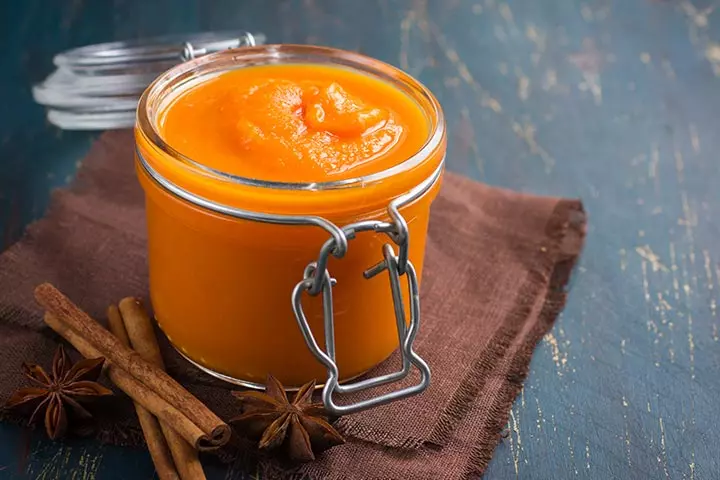
Preparation time: 10 minutes
You will need:
- 1tbsp orange juice
- ½ cup carrots (peeled, chopped)
- Cinnamon
How to:
- Cook carrots until soft. Add in orange juice and cinnamon powder. Blend well.
Give oranges as fruit or churn out a yummy recipe from them. Either way, your baby is most likely to like the fruit.
Frequently Asked Questions
1. When can babies have orange juice?
After the introduction to solids, you may give orange or any other juice to your baby as long as they do not react to acidic fruits. However, dilute one part juice with ten parts water. Offer not more than 120ml juice a day. Offer fruit or vegetable juice in a cup or a beaker, not in a bottle or before bedtime.
It is better to give your baby whole oranges than juice as the latter affects the enamel of the milk teeth. Also, as the pulp is lost from the fruit, several essential nutrients are lost.
2. Can babies eat mandarin oranges?
Yes, babies can eat mandarin oranges as they get close to 12 months if they do not show any allergic reactions to citrus fruits.
3. Is orange squash good for babies?
It’s not a good idea to offer fruit squashes and cordials to your baby. The high sugar and/or sweetener content in those drinks can cause tooth decay, besides encouraging your baby to have a sweet tooth. Moreover, they have little to no nutritional value.
4. What are the alternatives for citrus fruits?
Many foods other than citrus fruits can fulfill your baby’s daily vitamin C requirement, as they need only 35mg of it. The requirement can also be met through nutrient-dense fruits such as guava (the richest source of vitamin C), melons, ripe papayas, baked potatoes and spinach. These foods have a low incidence of food allergies and sensitivity reactions.
5. Can I use citric acid to preserve homemade baby food?
Using a drop or two of lemon juice as a preservative in a fruit purée for babies should be okay. The drops are spread throughout the purée, and it is less likely for the infant to consume it at one go. But, avoid it if your baby has a clear sensitivity to citrus foods.
6. Can oranges cause allergies in babies?
Yes, in some rare cases, oranges can cause allergic reactions due to their acidity, particularly in infants with a family history of allergies. Symptoms may include skin rashes, swelling, or itching. Consider introducing oranges to your baby after they turn one year old.
When feeding oranges to babies for the first time, start with minimal amounts. Since it is a citrus fruit, your baby’s stomach may be sensitive to ascorbic acid. Introduce the fruit to them only after the recommended age. Start with smaller pieces, and later, give oranges to your baby in the form of juice or the delicious recipes listed above. Follow the three-day rule and make a note of any allergic reactions. If they show any signs of allergy, discontinue feeding your baby oranges and report to your pediatrician.
Infographic: Ways To Include Oranges In Baby’s Diet
Rich in vitamin C, oranges are juicy, pulpy citrus fruits that can be a delicious and healthy addition to your baby’s weaning diet. However, when feeding oranges to your little one, follow the tips in the infographic below. Take a printout of it and stick it to your kitchen wall!
Some thing wrong with infographic shortcode. please verify shortcode syntax
Illustration: Oranges For Babies: Right Time To Introduce Benefits And Recipes

Image: Stable Diffusion/MomJunction Design Team
Oranges are a vital source of Vitamin C. Are you thinking of introducing it to your baby? Check out this video to know the right time to introduce them to ensure your baby’s health and safety.
References
- Effects of Early Nutritional Interventions on the Development of Atopic Disease in Infants and Children: The Role of Maternal Dietary Restriction Breastfeeding Timing of Introduction of Complementary Foods and Hydrolyzed Formulas.
https://publications.aap.org/pediatrics/article/121/1/183/71045/Effects-of-Early-Nutritional-Interventions-on-the - Oranges raw navels.
https://fdc.nal.usda.gov/fdc-app.html#/food-details/746771/nutrients - Health Benefits Of Orange.
https://ctclusi.org/wp-content/uploads/2025/12/health-benifits-of-oranges.pdf
Community Experiences
Join the conversation and become a part of our nurturing community! Share your stories, experiences, and insights to connect with fellow parents.
Read full bio of Komal Patel
- Lisa Richards is a certified nutritionist coach from the Institute for Integrative Nutrition. She is an author at the Candida Diet (thecandidadiet.com), with 17 years of experience.
 Lisa Richards is a certified nutritionist coach from the Institute for Integrative Nutrition. She is an author at the Candida Diet (thecandidadiet.com), with 17 years of experience.
Lisa Richards is a certified nutritionist coach from the Institute for Integrative Nutrition. She is an author at the Candida Diet (thecandidadiet.com), with 17 years of experience.
Read full bio of Swati Patwal
Read full bio of Rohit Garoo
Read full bio of Vidya Tadapatri







